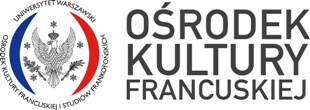Le mardi géopolitique du 23/02/2021

Le Centre de civilisation française et d’études francophones, la Faculté de sciences politiques et d’études internationales de l’Université de Varsovie et le Groupe d’études géopolitiques vous invitent à la rencontre dans le cadre du séminaire MARDIS GÉOPOLITIQUES.
Challenges connected to the concept of European defense from the Polish position. Understanding and misunderstandings
Amb. Tomasz Orłowski
le mardi 23/02/2021
15h00 – 16h30
Le séminaire aura lieu en ligne : https://meet.google.com/zvh-mesv-xfj
La rencontre se tiendra en anglais.
Abstract
To address question simply. Almost 30 years ago, the EU defined the Petersberg missions. At that time, it had 12 member states. 20 years ago, work began on EU battlegroups. At that time, the Union consisted of 15 member states. It will be soon 10 years, when Poland took over the presidency of the EU Council, which has set the European defence policy and the initiation of PESCO as one of its priorities. The Union already had 27 member states.
A month ago, the new High Representative Josep Borell visited Moscow, where he was publicly humiliated by the Russian Foreign Minister and, in fact, the Common Foreign and Security Policy was publicly humiliated. Are there any reasons to believe that there is a chance for a common policy during the term of office of the current EU authorities?
Poland’s attitude to European defence is definitely not obvious and it is difficult to find it satisfactory for the supporters of ever closer union as am I. In order to understand it, let me present it in four following questions:
- Is there full compliance of the member states with regard to the expected model of cooperation between NATO and the EU?
- What are the possibilities of creating a coherent and sustainable EU common foreign policy, the tool of which is the security and defence policy?
- Is the shaping of the European armaments market in line with the expectations of all member states, or only of the largest producers?
- Does understanding the potential involvement of national armed forces in European missions allow us to think about using them in the implementation of the European Security Strategy?
Bio
Tomasz Orłowski. Titular ambassador. A graduate of the University of Łódź, the Nicolaus Copernicus University in Toruń and the University of Poitiers, Institut des Hautes Études de la Défense Nationale in Paris. Corresponding member of the French Académie des Sciences Morales et Politiques.
Since 1990, works at the Ministry of Foreign Affairs. First secretary at the Polish Embassy in Paris (1990-1994), deputy director of the European Department, Ministry of Foreign Affairs (1994-1996), minister plenipotentiary at the Polish Embassy in Rome (1996-2001).
Secretary General of the Polish National Commission for UNESCO (2001-2004), member of the Executive Council and rapporteur of the UNESCO General Conference. Deputy director of the Department of the UN System and Global Issues, Ministry of Foreign Affairs (2004). Ambassador, director of the Diplomatic Protocol (2005-2007).
Ambassador of the Republic of Poland to France (from 2007-2014), Deputy Minister of Foreign Affairs (2014), Ambassador of the Republic of Poland in Italy (from 2015-2017).
He has lectured on international relations and diplomacy at the University of Wrocław, SWPS University, the Diplomatic Academy and the National School of Public Administration, Collège d’Europe and École Nationale d’Administration in Paris.
He currently teaches at the Diplomatic Academy and Sciences Po in Paris, Paris School of International Affairs.
